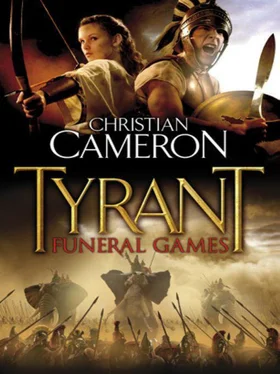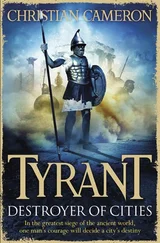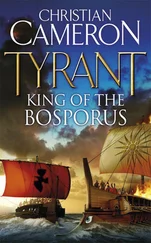Christian Cameron - Funeral Games
Здесь есть возможность читать онлайн «Christian Cameron - Funeral Games» весь текст электронной книги совершенно бесплатно (целиком полную версию без сокращений). В некоторых случаях можно слушать аудио, скачать через торрент в формате fb2 и присутствует краткое содержание. Жанр: Исторические приключения, на английском языке. Описание произведения, (предисловие) а так же отзывы посетителей доступны на портале библиотеки ЛибКат.
- Название:Funeral Games
- Автор:
- Жанр:
- Год:неизвестен
- ISBN:нет данных
- Рейтинг книги:5 / 5. Голосов: 1
-
Избранное:Добавить в избранное
- Отзывы:
-
Ваша оценка:
- 100
- 1
- 2
- 3
- 4
- 5
Funeral Games: краткое содержание, описание и аннотация
Предлагаем к чтению аннотацию, описание, краткое содержание или предисловие (зависит от того, что написал сам автор книги «Funeral Games»). Если вы не нашли необходимую информацию о книге — напишите в комментариях, мы постараемся отыскать её.
Funeral Games — читать онлайн бесплатно полную книгу (весь текст) целиком
Ниже представлен текст книги, разбитый по страницам. Система сохранения места последней прочитанной страницы, позволяет с удобством читать онлайн бесплатно книгу «Funeral Games», без необходимости каждый раз заново искать на чём Вы остановились. Поставьте закладку, и сможете в любой момент перейти на страницу, на которой закончили чтение.
Интервал:
Закладка:
‘When you fall?’ Satyrus asked.
Philokles gave him a brilliant smile – the kind of smile his tutor scarcely ever smiled. Then the Spartan ran out of the ranks towards Ptolemy. He grabbed at his bridle, and they could see Ptolemy nod and signal to the trumpeters, and the signal for the advance rang out before Philokles was back in the ranks.
Ptolemy turned his horse and rode away towards the cavalry fight on the left. Way off to the right, Satyrus saw Diodorus. He wasn’t eating sausage any more, but he hadn’t moved.
The Foot Companions were still not in their place.
Philokles jumped out of the front rank, held his spear across their chests and roared ‘Dress the line’ so loudly that Satyrus flinched, helmet and all.
‘Prepare to execute the marine drill!’ he called. He ran along the front rank, heedless of the javelins that were starting to fall, until he reached Theron, and then he sprinted back, fast as an athlete despite age and wine and armour.
‘Spears – up!’ came the order. They were less than a stade from the enemy. A handful of brave or stupid psiloi still stood between the two mighty phalanxes, but they were scattering, running for the flanks. Satyrus watched the last of their own archers running off to the right to get around the killing ground.
Now that he could see the enemy phalanx, he could see that it looked bad – there were ripples and gaps where he assumed the elephants had burst back through, and officers were dressing the ranks.
Half a stade, and he could see the enemy move – they had their ranks dressed – they shivered as if the phalanx was a single, living organism and the whole thing leaned forward as the enemy began their advance, and suddenly everything happened at twice the speed.
The length of a sprint – he could see the emblems on their shields.
‘Spears – down!’ came the command – by trumpet, repeated by word of mouth. And the sarissas came down. In the Phalanx of Aegypt, the men in front had the shorter spears, and they lifted them over their heads in unison – a sight that literally banished fear, as training took over and Satyrus got his shoulder firmly under the rim of his aspis.
‘Sing the Paean!’ Philokles called, and the Alexandrians started the call to Apollo. The song carried him forward a hundred paces – literally buoyed him up – but at its end, in step and facing the foe, he still had ten horse-lengths of terror to face.
Ten horse-lengths, and he was confronted by a wall of spears that filled his mind as Amastris’s body had filled it, so that nothing and no one could take his eyes away from the lethal glitter of twelve thousand pike points.
The White Shields were slowing down. Ares ‘Eyes front!’ Philokles roared. ‘Ready, Alexandria!’
The taxeis growled.
Five horse-lengths. The thicket of steel was pointed right at his throat – his head – too thick to penetrate. Thick enough to walk on.
It was impossible that a man could face so much iron and live.
His legs carried him forward.
‘Charge!’ Philokles’ voice and Rafik’s trumpet sounded together, and the front rank responded like trained beasts – left shoulder down, spear down, head down.
Spears rang against his aspis, reaching for his guts, again and again, and he bulled forward, legs pushing, blow to his helmet, step forward, another blow and another with enough weight to shift him sideways so that he stumbled, but he pushed, he pushed, nothing but the power of his legs and the weight of a dozen spear shafts on his aspis tilted almost flat like a table, and he pushed – Diokles’ shield pushing him forward – through! UP and PUSH and he rammed his spear straight ahead, felt the weight of Diokles pushing him another half pace forward. THROUGH!
To this right, Philokles roared like a bull and his spear hit a man’s helmet just over the nasal and burst it in a spray of blood and the man fell back and Philokles pushed Suddenly, as if his wits had been restored, Satyrus saw the fight for what it was, and in one smooth motion he killed a phalangite – not the man in front of him, but the man in front of Abraham whose shield was open, and then he placed his big shield against the enemy’s and pushed and Abraham pushed forward into the new space, on his own or carried forward by his file, and now he took the file-follower by surprise and simply knocked him down, and Satyrus rammed his spear over his shield, once, twice, three times – connected with something – again and again. Glance at Philokles, cover his shoulder – and then his opponent was down and Satyrus was forward a step. Rafik’s man was uncovered to his right, and his spear was there, scoring a clean hit on the man’s helmet. His point didn’t penetrate but the man’s head snapped back and he stumbled and Rafik stepped on the man and went forward and Rafik’s file-follower put his butt-spike through the man’s chest. Satyrus’s opponent roared, pushed his shield and Diokles killed him over Satyrus’s shoulder and Satyrus leaped forward to cover Philokles, who had put another man down and was moving forward again. The men behind the man facing Philokles were flinching away.
Now Satyrus was chest to chest with another man. His opponent dropped his sarissa and ripped his sword from the scabbard and Satyrus felt the wash of the man’s onion breath on his face and he was pushed back and the ranks locked – Abraham grunting, and Namastis shouting in Aegyptian.
Satyrus’s spear broke in his hands, trapped against a shield. He swung the butt-spike like a mace and scored against the tip of the big Macedonian’s shoulder where his shield didn’t cover it, and then his body moved as if he was making a sacrifice – hand up, grab the hilt under his armpit, sword drawn, down, over, the feint – back cut. The Macedonian missed his parry, his kopis over-committed, and his wrist bones parted as Satyrus’s blade cut through his arm and glanced off the faceplate on the other man’s Thracian helmet. The blood from his severed hand sprayed and blinded Satyrus, and he flinched, stumbled – but forward, because Diokles shoved him and then stabbed at his next opponent over his head, saving his life. A sword scraped along Satyrus’s helmet and he lost a piece of his left ear, although he didn’t feel it.
‘One more step!’ the voice of the war god said. ‘Now!’
The whole Phalanx of Aegypt planted and pushed. The Macedonian phalanx shuddered, and then, as if, having given one step, they could give another, they fell back.
And now the Aegyptians caught fire. Maybe they’d never believed. Or maybe they’d just hoped – but in those seconds, those heartbeats, the same message went out to every man in the taxeis.
We are the better men.
‘Alexandria!’ Namastis called. He was the first, Satyrus thought, but then everyone was shouting.
Then there was no battle cry that any one man could discern but a roar, a roar of rage and triumph and fear – the bronze-lunged voice of Ares – and the enemy phalanx gave another step, another. Something had broken at the back and the spears were dropping, and suddenly there was Nothing. Scattered men stood confused in front of Satyrus, the enemies too foolish to have broken, and Satyrus killed one without thinking, stepping up to the man and cutting – one, two, three, as fast as thought.
‘Ares,’ Philokles said. He sounded weak. ‘Satyrus! We’re not done. Rally them. Rafik, sound the rally!’
Satyrus looked back. He couldn’t see anything behind him but his own men, but to the side, there were still enemies – some so close that he could hear the orders their officers shouted.
The notes of the rally sounded. Philokles was leaning on his spear. Satyrus thought that he was just breathing hard, but then he saw that there was blood all down the Spartan’s legs – pouring away from under his bronze breastplate.
Читать дальшеИнтервал:
Закладка:
Похожие книги на «Funeral Games»
Представляем Вашему вниманию похожие книги на «Funeral Games» списком для выбора. Мы отобрали схожую по названию и смыслу литературу в надежде предоставить читателям больше вариантов отыскать новые, интересные, ещё непрочитанные произведения.
Обсуждение, отзывы о книге «Funeral Games» и просто собственные мнения читателей. Оставьте ваши комментарии, напишите, что Вы думаете о произведении, его смысле или главных героях. Укажите что конкретно понравилось, а что нет, и почему Вы так считаете.












